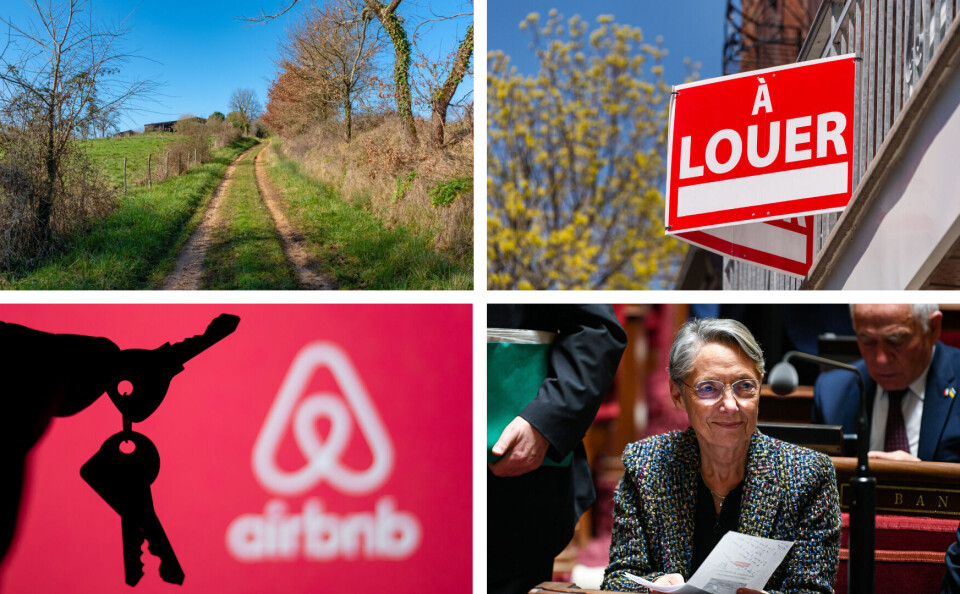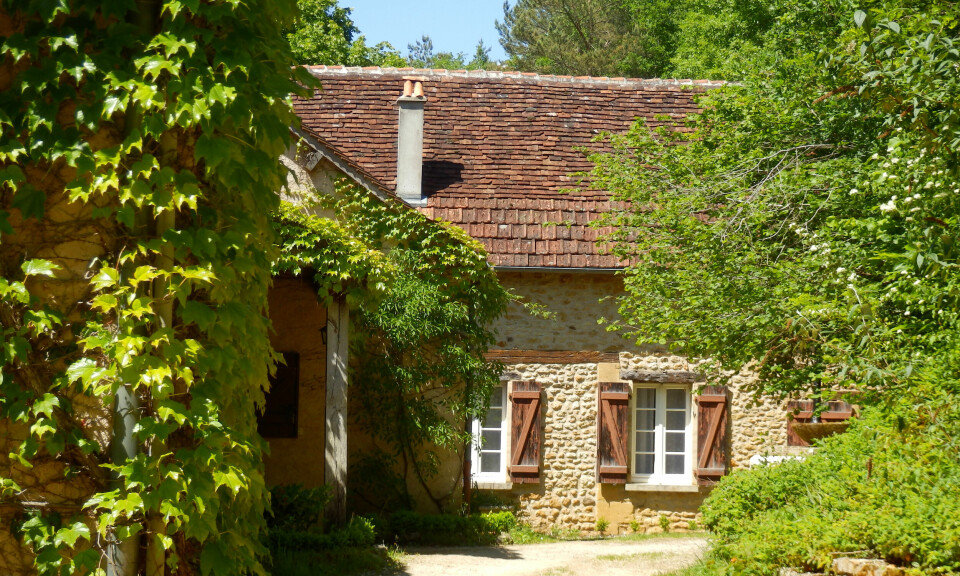-
Tough Airbnb rules in Marseille prompt many property owners to sell
City council reduce time that a property can be rented to short-term guests
-
Big limitations on number of new second homes in Chamonix
Some 70% of the housing stock in the popular mountain resort town are currently second homes
-
City in south-west France takes property owner to court for €100,000
The case is the latest move by authorities in France against short-term rental landlords
French property updates: Brit’s second home ‘hell’, Airbnb ban mooted
Plus, the online tool helping prospective tenants apply for flats faster and an innovative Bordeaux building that adapts to multiple uses

1. Officials call for tougher response to Briton’s claims of harassment at second home
Departmental and regional officials have lent their support to a British man at the centre of a longstanding row over a bridle path that runs through his property.
Elected representatives, including the local MP, are calling for a strong response from the government and for the courts to be more severe after Roderick Sinclair, 78, claimed he and his local mayor have been through “hell” since privatising a public right of way at his second home in Montjoi, Tarn-et-Garonne.
Read more: Noisy neighbours: France’s most outlandish and notorious disputes
Mr Sinclair, a retired stockbroker, bought the property in 1995 but says the dirt bridle path running through the garden was rarely used at the time.
It was only after it was listed on a map for quad bike enthusiasts that Mr Sinclair decided, in agreement with the village council, to buy a piece of land 100m away and make a new road.
“The idea was that we would do a swap, I would give the new path to the village and they would give me the old path,” he told The Guardian.
However, he has subsequently discovered the deal was not registered correctly and Pierre-Guillaume Mercadal, a local pig farmer who set up a business in Montjoi in 2017, continues to use the path, despite having access to his land along the new road.
Mr Mercadal says the alternative route is in too bad a state for delivery vehicles to use and claims his livelihood is threatened.
“All Mr Sinclair had to do was to pay for a new road that was as good as or better than the existing road that passes by his house and the problem would have been solved. He would not do that,” he told the newspaper.
The row hit headlines in France when details of an alleged campaign of harassment against both Mr Sinclair and the local mayor, Christian Eurgal, emerged.
Mr Sinclair, who lived in the Montjoi house full-time between 2011 and 2015, said he has been intimidated, had his property damaged, and been held “to ransom” with letters demanding €75,000 to be left in peace.
Mr Eurgal, meanwhile, claimed he had received daily death threats after he was featured in an online video by a far-Right YouTube influencer, who took up the farmer’s case. He failed to respond to The Connexion’s request for further details, despite initially proposing a face-to-face meeting.
Read more: Hundreds of French mayors quit due to ‘Covid and increased workload’
“What is happening at Montjoi is a disgrace,” Jean-Michel Baylet, president of the communauté de communes des Deux-Rives (Tarn-et-Garonne), told La Dépêche.
“It is the responsibility of the courts and the state to put an end to it. A newcomer to the commune a few years ago is trying to terrorise the mayor, the elected representatives and the local population for his own personal ends.
“It's disgraceful and it's not our tradition. It's time to put an end to it.”
2. Short-term rentals could be banned in French tourist hotspots
Offering short-term rental of a property, such as on AirBnB, could become harder in France, according to Housing Minister Olivier Klein.
New rules could give local mayors powers to further regulate short-term rentals and second homes in their jurisdictions, thanks to a national campaign seeking law changes.
Measures could include increasing taxes on second-homes, and even banning short-term rentals from operating in tourist hotspots altogether, although exact rules will be up to local mayors to implement.
“We have to be a tourist country – it's an opportunity and we have to respect it – but we also have to enable our fellow citizens, wherever they are, to find accommodation,” said the minister.
When asked how far regulations could go, the minister replied: “There is no taboo”.
A complete ban on new short-term rentals is already being trialled in Italy, in the historic city centre of Florence.
Mr Klein’s comments encapsulate the battle in some regions, such as Brittany and the Pays-Basque, where local economies are dependent on tourism, but potential long-term renters and homeowners are being driven out by prices.
Read more: The French tourist cities taking a stand against Airbnb-style lets
Leaving the final choice up to mayors, however, instead of through a top-down directive, will allow authorities to adapt rules according to local needs.
Recent ideas from MPs to clamp down on short-term lets include reducing the days main and secondary residences can be rented out, as well as limiting the power of Airbnb landlords who buy up swathes of properties to rent out.
Read more: Tax Airbnb rentals more, demand French MPs
3. Online tool speeds up rentals by applying on a tenant’s behalf
A new web service promises would-be tenants will no longer miss out on suitable properties by automatically applying for them 10 minutes after a new advert has been posted.
The platform, called Locathèque, launched earlier this month on the direct sales and lettings site Particulier à particulier (PAP) as part of a partnership with the public service DossierFacile.
It sends verified rental files to the owners of suitable properties to "save valuable time for tenants and landlords", said PAP.
The tool is free for tenants to use. They simply upload the necessary documents (ID, pay slips, details of guarantors etc) to their online space on the site, which should be approved in less than 24 hours.
After this, they are invited to enter details of their rental search criteria. When new adverts matching their specifications (size, budget, location etc) are listed on the site, Locathèque drafts an application message and attaches the rental file almost immediately.
Read more: How do I know if flat listing respects French rent control rules?
On average, there are 83 applications per studio rental advert in areas of high demand, says Corinne Jolly, president of PAP.
“The Locathèque tool will save a lot of time for future tenants, who will no longer need to spend the whole day on their phone for fear of missing an advert,” she told Capital.
For landlords, publishing an advert on PAP includes access to applications from Locathèque and costs €15 per week. After receiving the rental files of would-be tenants online, they are free to contact the applicants to arrange a visit.
PAP started life as a magazine more than 45 years ago. Sellers would pay for an advert, with or without photo but with a phone number, and do the rest themselves, arranging paperwork with notaires and getting all the legal documents lined up.
Read more: Online estate agents in France widen horizons for house-hunters
Listings were by department and buyers were not screened. The magazine thrived and subsequently moved online, seeing thousands of properties sold and rented without estate agent involvement (and thus no percentage payment of the sales value / agent rental payment).
4. Three measures announced to end housing crisis
A plan to end France’s housing crisis – including three key law changes – was announced by Prime Minister Élisabeth Borne on Monday (June 5).
The first of these changes was a controversial end to France’s Loi Pinel, which provides tax reductions for buy-to-let landlords, in 2025.
Versions of the scheme have existed in France since 1984’s Loi Méhaignerie, but finance and tax officials say it is costing the state too much money for dwindling returns.
Housing developers are worried, however, as last year some 31% of new properties constructed were bought by buy-to-let landlords using the scheme.
The second measure announced is an extension of the prêt à taux zéro (PTZ), or zero-interest loan, until 2027.
Primarily aimed at first-time buyers, the new rules will see the purchase of family housing units in high-income areas included in the possible locations where the loan can be applied.
The Connexion recently answered a question about the PTZ which you can read here.
The last measure is anextension to the joint real estate law, which allows homeowners to purchase a property but not the land it is situated on, thus reducing property prices.
Home purchases can be up to 50% cheaper, and more households will be able to benefit from the scheme thanks to changes to threshold levels.
CDC Habitat and Action Logement will be asked to buy 50,000 houses between them as part of the scheme.
Read more: Number of new housing projects in France ‘at lowest level since 2010’
5. First flexible building permit approved in Bordeaux
Is it a block of flats? Is it office space? A nine-story building planned for Bordeaux can actually be both thanks to a flexible building permit which allows the units inside to serve various functions.
Read more: Make sense of local rules governing planning permission around France
The property adheres to regulations for both residential and commercial spaces, and has features such as ‘false floors’, which allow spaces to be easily changed depending on what they are being used for at the time.
Halls, lifts and staircases also comply with multiple sets of regulations.
Some safety rules were more difficult to overcome than others, however, such as instructions in the event of a fire.
“In an office, you have to evacuate the building in the event of a fire, whereas in your own home you have to stay inside and wait to be let out. So we had to combine these two operating methods,” Thierry Bièvre, chairman of the Elithis property group behind the new site, told Le Figaro.
“You can't just say to yourself, this is an office, this is a retirement home [without having appropriate measures in place to abide by different rules]. The building offers a range of functions," added Mr Bièvre.
Work is scheduled to start at the beginning of 2024, with a 400m² crèche on the ground floor, followed by two levels of office space and then residential units.
This layout and function can be switched at a later date, however, without the need to apply for new building permits.
Read more: Can we modify porch plans in France without reapplying for permission?
“Reversible design… means anticipating the evolution of a building even before it is built so as to minimise the adaptations and costs involved in its future transformation,” said Patrick Rubin, founder of the Canal Architecture agency, which designed the building.
Related articles
Rural house prices boost, €12,000 homes: five French property updates
Key points to help you complete France’s new obligatory property form
Should France ban new gas boilers? The case for and against
























